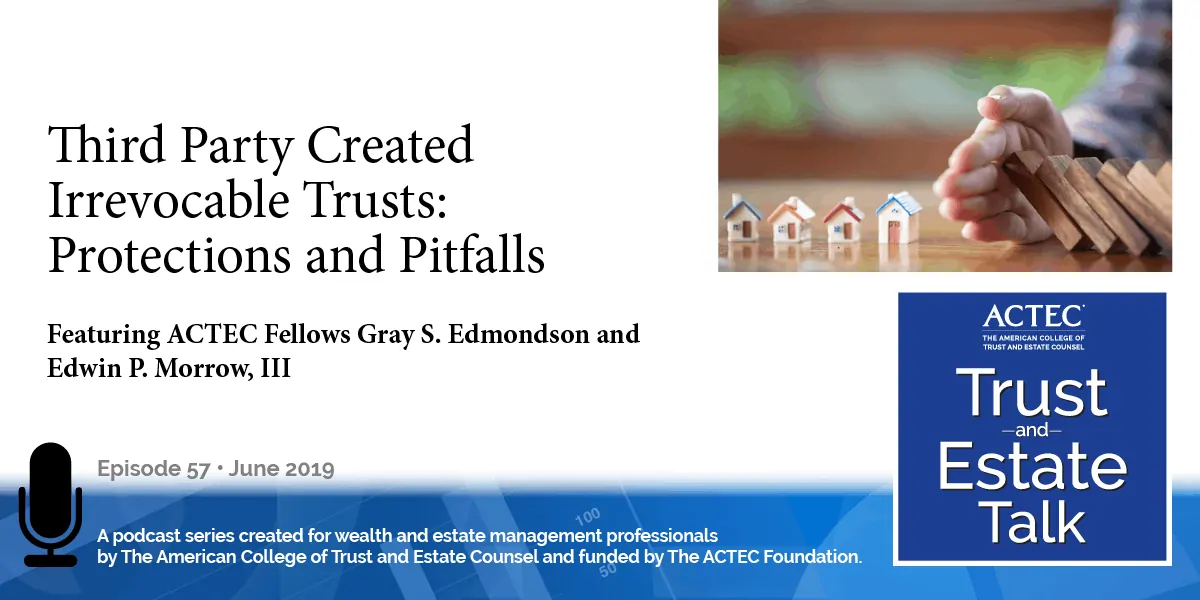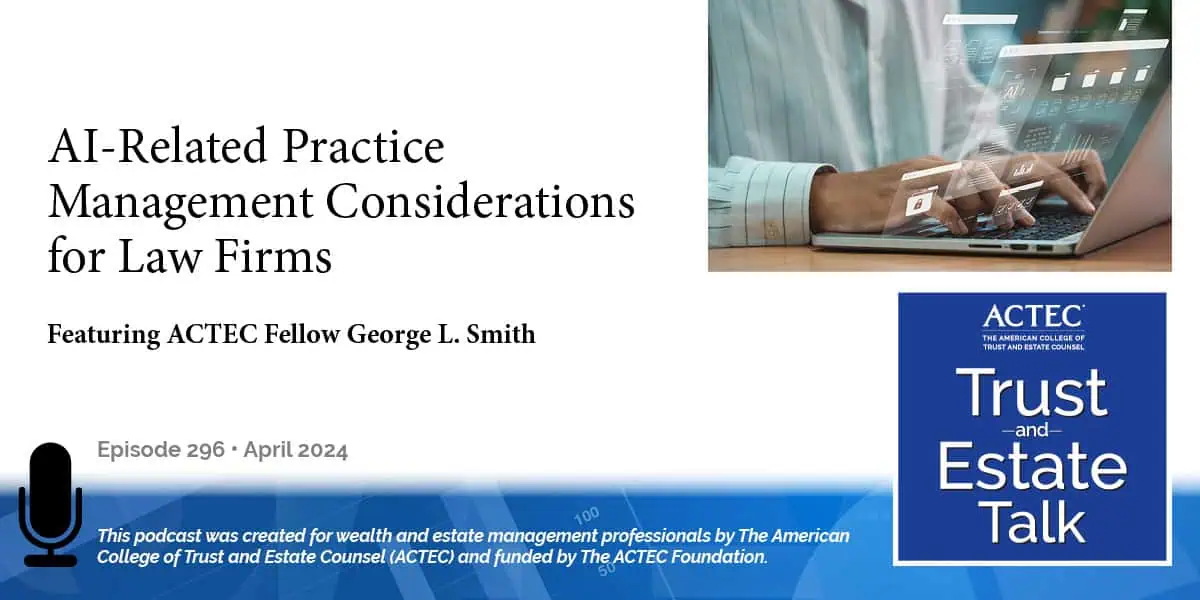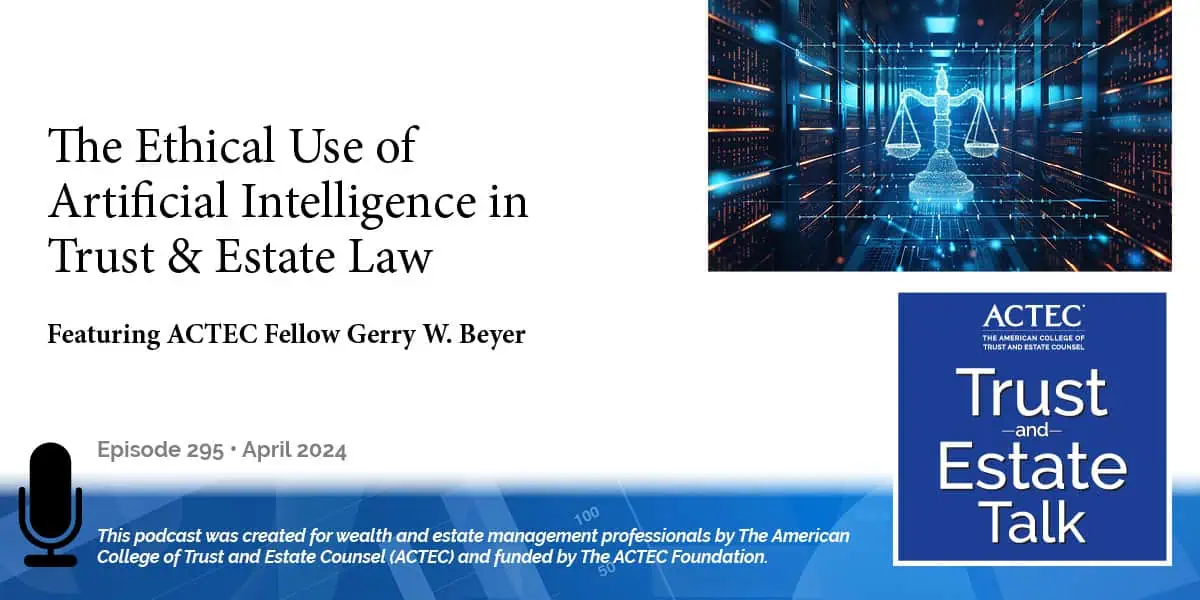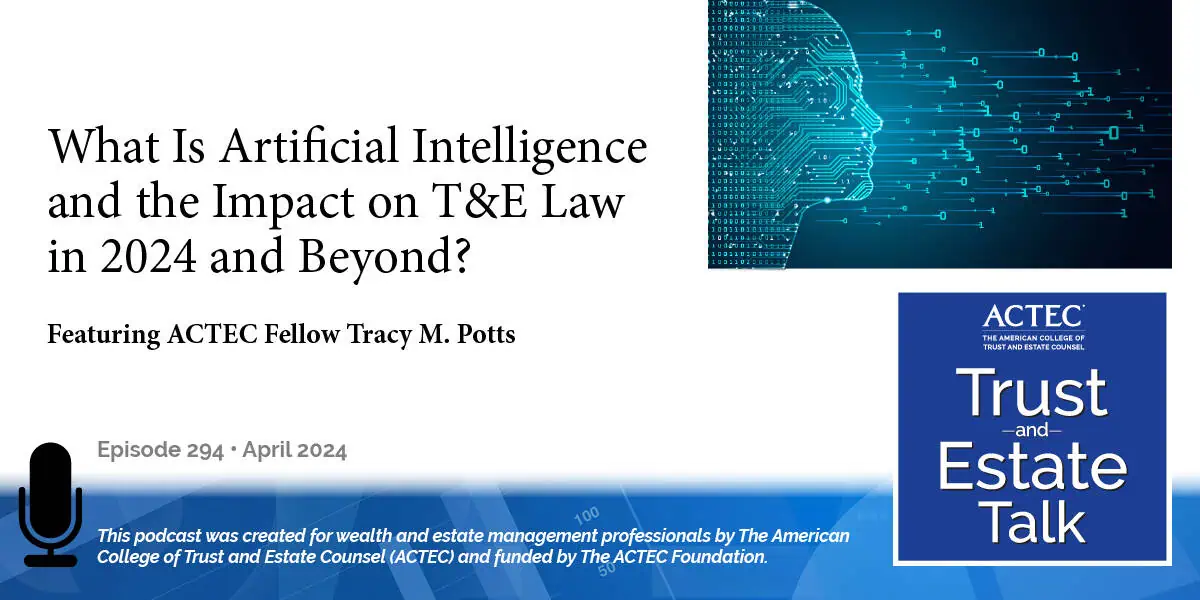Third-Party Created Irrevocable Trusts: Protections and Pitfalls

“Third-Party Created Irrevocable Trusts: Protections and Pitfalls,” that’s the subject of today’s ACTEC Trust and Estate Talk.
Transcript/Show Notes
This is Susan Snyder, ACTEC Fellow from Chicago. There are protections and pitfalls when third parties create irrevocable trusts. On that topic, you’ll be hearing today from ACTEC Fellows Gray Edmondson, from Oxford, Mississippi and Ed Morrow from Cincinnati, Ohio. Welcome, Ed and Gray.
Thank you. Third-party created irrevocable trusts are definitely one of the best vehicles to protect and transfer assets, but there are some rare exceptions when such trust might be pierced or considered similar to a self- settled trust. Gray, what do we mean by “self-settled” and who is a “settlor” and why does it matter?
Right, the settlor of a trust is the person who sets up a trust typically, a person if you look at the definition that’s in Black’s Law Dictionary, the Uniform Trust Code and other sources, it’s the person who conveys property or contributes property to a trust. There’s some ambiguity in some places and sometimes it’s not the person whose name is on the top of the document, but it’s the person that contributes assets to the trust, generally. Why it matters is that common law as well as statutes in most states, say that the settlor of a trust cannot protect those trust assets from the claims of that person’s creditors. So, determining who the settlor is can be very important in determining what rights creditors may have to access assets of the trust.
Where this comes up very frequently would be easy examples. If I set up, for example, a trust for my spouse, I typically would be the one to contribute assets. But Ed, you can think of some circumstances where there might be situations where my spouse would be deemed to be the settlor rather than me.
And you may have to watch how that particular trust is funded. So, if I set up a trust for my wife and children and that would be considered a third party-created trust, if my wife or children were sued, in most cases that would be well protected under state law, federal bankruptcy law, etcetera. But what happens if we draw a check from a joint bank account or my wife contributes the assets into the trust? Now she would be considered a settlor, right Gray?
That is right. And most states – I say most states, many states have adopted the Uniform Trust Code and the Uniform Trust Code goes on to say, and common law says this as well, that each person who contributes assets to the trust is deemed to be the settlor of the portion of the trust they’ve contributed assets. So, if it was a joint account and those were 50/50 assets than theoretically even though my name is on the top of the document as settlor, my wife’s creditors may be able to access 50 percent of that trust
And it may be an issue in community property states despite one person’s name being on the title, it may be deemed to be 50 percent owned by each spouse.
That’s right, that’s right. And neither one of us practice in a community property jurisdiction, but we’re familiar with the fact that community property lawyers oftentimes need to enter into separate property or transmutation agreements to avoid these types of results. There are any number of other situations that we commonly encounter from a planning perspective where the question can arise, who is the settlor of this trust? And, one of the more common situations is your standard Crummey Trust or the irrevocable trust we’ll set up for the purpose of owning a life insurance policy, for example. And we will contribute premium checks every year; give our children or our grandchildren or whomever a power to withdraw that amount to qualify for the annual exclusion.
But Ed, I know you’ve looked a lot into those circumstances where that power hangs out there for say 30 days and it lapses. Well, is my child or grandchild going to be deemed to be the settlor for not taking that money out of the trust?
And generally that answer is no, but you do have to be careful to look to state law and we do have on the ACTEC website a 50 state chart (Creditor Protection for Assets Subject to Presently Exercisable General Powers of Appointment (Including Crummey, “Five and Five” or Other Withdrawal Powers) Pre and Post Lapse in Trust) that I developed with all the different statutes in all 50 states that you can consult, and there’s a hyperlink to your particular state in that chart. But the general answer is most states have some protection to at least an amount equal to 5 percent or $5,000. So, if there’s a lapse of the power and it’s less than 5 percent of the corpus that power holder, the beneficiary – might be a child or grandchild or whomever in your case – would not be considered a settlor of the trust. And so even though there’s still a beneficiary, they would not be considered a settlor, but it becomes a more difficult analysis if the lapse is above 5 percent and then we’d have to go to each individual state statute to see whether they would be considered a settlor or not.
And not every state has answered those questions, have they?
Not exactly, there’s still some unsettled law.
I can say my state of Mississippi has recently attempted to pass some legislation to answer some of these questions unsuccessfully and we currently have no law that answers these questions. And so it doesn’t just arise in the context of withdrawal rights, there are other situations where it may come up: commonly drafted powers we’ll put in trust to create grantor trust for income tax purposes to ignore those trusts for income tax purposes, such as the power to substitute assets or a tax reimbursement provision where the trustee is granted discretion to reimburse the grantor for income tax from the trust. Those could potentially be deemed to create a self-settled trust, if the trustee can make payment of income tax dollars to the grantor, the grantor has retained some right to get assets from the trust.
Marital trust. We oftentimes set up marital trusts for a spouse: at the death of that spouse, hose assets, either by default under the document or through the exercise of a power held on my spouse or someone else’s spouse will end up back in trust for me, the original settlor. Did my spouse become the settlor merely because of their death and their power to decide where those assets ended up going or inclusion of those assets in their taxable estate?
These are the types of scenarios we see regularly. And some states have addressed these and some states haven’t. Some states have no answer and some states have a partial answer. So, what are some other situations, Ed, that you can think of that would raise these questions?
Well, you could have some rare situations where you have a trust created by court order, because perhaps litigation settlement and somebody instead of winning, you know, a judgment settlement with cash, the court orders the money to be put into a trust and often for a disabled person of some sort. The question then becomes who’s the settlor of that trust? It’s probably not the court, and it’s probably considered the beneficiary for whom had the gravamen of the claim and the litigation.
That’s right. And there are also – we typically and when we draft documents, we’ll consider the possibility of including what’s called powers of appointment in documents where we’ll give a beneficiary or sometimes even a third party, the right to determine when and where assets should be distributed among a class of potential appointees, and that could be during lifetime or at death. There are questions that arise about whether the exercise of that power causes that person to become the settlor of the trust or whether the lapse of that power unexercised would also cause that person to become the settlor of the trust. And, the law out there isn’t perfectly clear. There have been some changes in the restatements of the law out there between the current version and prior versions as to what the answer to that may be. So, when we’re drafting trusts, Ed, when we are having to consider the possibility of these issues, what are some things you can do in drafting a trust that would help to hopefully avoid running into these problems?
Well, the first is to explore state law in each particular case. And if you don’t have very clear state law you might consider drafting the trust to avail yourself of the law of another state. There are certain states that are known to be very debtor friendly and anti-creditor for state law and market heavily for these types of trusts – Delaware, South Dakota, Alaska – and there’s an increasing number of states that are making their state laws much more friendly. My home state of Ohio is very trust friendly, very debtor friendly in that regard as well. So that would be one thing is if your law was unsettled in a particular state, you can use a different state law that might require using a different trustee that’s out of state as well.
Another one would be if you do have certain powers and you had mentioned earlier a swap or what we call a power of substitution power. Just in case, we wouldn’t want the possibility of a bankruptcy trustee or receiver getting a hold of that power. What if we have the consent of another to be able to exercise that power as well, jointly held for instance? You want to avoid quid pro quo funding. In other words, that’s an old Latin term meaning “I scratch my back, you scratch mine.” In other words, if I set up a trust for my brother or my wife and they set up a near identical trust for me, we have what in the tax world we call a reciprocal trust doctrine that may be at play. We don’t have a lot of good state law creditor rights cases on this particular point, but there’s a very strong case to be made that, really, you’re settling the trust that your brother settled for you and vice versa and these can be uncrossed. So you want to avoid, not just have – you could have the best drafted trust in the world by the most genius attorney, but if you don’t pay attention to how it’s funded and how it’s administered, that could be a red flag. So, in drafting stage, you want to pay attention to who the trustees are and how is it funded. An independent co-trustee can go a long way too. When you look at the cases that do bust a trust, it’s often somebody that’s not administering it well, they’re using it as their own pocketbooks, so to speak. If you have a professional co-trustee or professional trustee at the helm, those kinds of shenanigans are much less likely to apply, and a third-party trust is much more likely to be protected if it ever comes to pass – word that creditors are at bay so to speak. So those are some tips I think in the drafting stage and consideration when you’re funding.
Yeah. And if you have a trust that’s already been drafted and you see creditors lurking out there and you take a look at administration of the trust, the funding of the trust, the drafting of the trust and see some of these potential issues, there are some things that you could consider to undertake to hopefully avoid the concerns.
One would be to do what we call decanting, which is just you take the assets of one trust and put them into another trust and then you would do that into a trust that may be drafted just as Ed mentioned, sitused in a state that’s more trust friendly and trust beneficiary friendly that also maybe has an independent trustee and the like. Similarly, you could modify an existing trust for the same reasons. You may have what we call a trust protector in a trust that has powers to amend trust, revoke powers, do the like – the trust protector could take advantage of some of those possibilities.
Another choice you might have, a lot of trusts, whether they have a trust protector or decant, will have the ability to move the state of administration. You may choose simply to move the state of administration to a more friendly state. The beneficiary who holds maybe a power of appointment, as I mentioned earlier, could relinquish those powers or release those powers. There are also potential inclusion of forfeiture clauses as you could put in documents, where certain powers to the extent any creditor would arise would be automatically forfeited by the beneficiary. So, there are steps you could take to hopefully avoid this, both at the drafting stage as you said Ed, as well as if you see these issues arising to maybe, hopefully avoid problems.
Thank you Gray, thank you Ed for educating us on third-party created irrevocable trusts. Ed mentioned a chart that’s on the ACTEC website and we will put a link to that in the show notes for the podcast. Thanks.
If you have ideas for a future ACTEC Trust & Estate Talk topics, please contact us at ACTECpodcast@ACTEC.org.
Latest ACTEC Trust and Estate Talk Podcasts

AI-Related Practice Management Considerations for Law Firms
A discussion for law firms about how to incorporate AI in their practice management, including staff considerations, the “billable hour,” and more.

The Ethical Use of Artificial Intelligence in Trust & Estate Law
A law professor offers insights into the risks, rewards, duties and ethical considerations of lawyers using AI in their T&E practices.

What Is Artificial Intelligence and the Impact on T&E Law in 2024 and Beyond?
A primer on the types and uses of AI, then a deeper dive into the impact on trust and estate law from types to applications to ethical considerations.

